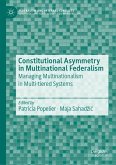This book conceives federalism not as a static institutional architecture, but as a dynamic formation always in flux. This may entail processes of federalization, but in some cases also lead to de-federalization. It looks at emerging federal structures worldwide and analyses federal structures: their emergence, operation and categorization. The contributors highlight that the "emergence" of these federal structures has multiple facets, from the recognition of ethnic diversity to the use of federalism as a tool of conflict resolution. Identifying and categorizing processes of federalization and defederalization in a variety of cases, the book provides much needed empirical and theoretical discussion on emerging federal structures and the changing nature of federalism in the post-Cold War era.
"This book is a significant contribution to the literature that genuinely advances our understanding of federalism. ... The process-driven framework and empirical findings provide a good starting point for further studies ... . I am confident that this book will be a valuable resource for scholars working on topics such as multilevel governance, substate nationalism, state-building, and conflict management in divided societies for many years to come." (Felix Schulte, Nations and Nationalism, Vol. 29 (2), April, 2023)








